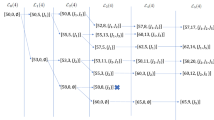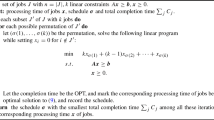Abstract
Most scheduling models assume that the jobs have fixed processing times. However, in real-life applications the processing time of a job often depends on the amount of resources such as facilities, manpower, funds, etc. allocated to it, and so its processing time can be reduced when additional resources are assigned to the job. A scheduling problem in which the processing times of the jobs can be reduced at some expense is called a scheduling problem with controllable processing times. In this paper we study the job shop scheduling problem under the assumption that the jobs have controllable processing times. We consider two models of controllable processing times: continuous and discrete. For both models we present polynomial time approximation schemes when the number of machines and the number of operations per job are fixed.
Partially supported by EU project APPOL, “Approximation and Online Algorithms”, IST-1999-14084.
Supported by Swiss National Science Foundation project 20-63733.00/1, “Resource Allocation and Scheduling in Flexible Manufacturing Systems”, and by the “Metaheuristics Network”, grant HPRN-CT-1999-00106.
Partially supported by Natural Sciences and Engineering Research Council of Canada grant R3050A01.
Access this chapter
Tax calculation will be finalised at checkout
Purchases are for personal use only
Preview
Unable to display preview. Download preview PDF.
Similar content being viewed by others
References
K. M. Anstreicher, Linear programming in \( O(\tfrac{{n^3 }} {{\ln n}}L) \) operations, SIAM Journal on Optimization, Vol. 9, No. 4, (1999), pp. 803–812.
Z. L. Chen, Q. Lu, G. Tang, Single machine scheduling with discretely controllable processing times, Operations Research Letters, 21 (1997), pp. 69–76.
T. C. E. Cheng, N. Shakhlevich, Proportionate flow shop with controllable processing times, Journal of Scheduling, Volume 2, Number 6, 1999, pp. 253–265.
M. Grigoriadis and L. Khachiyan, Coordination complexity of parallel pricedirective decomposition, Mathematics of Operations Research, 21(2), 1996, pp. 321–340.
K. Jansen, R. Solis-Oba and M. I. Sviridenko, A linear time approximation scheme for the job shop scheduling problem, Proceedings of the Second International Workshop on Approximation Algorithms (APPROX 99), 177–188.
E. L. Lawler, (1977) “Fast Approximation Algorithms for Knapsack Problems”, 18th Annual Symposium on Foundations of Computer Science, 206–213.
E. L. Lawler, J. K. Lenstra, A. H. G. Rinnooy Kan, and D. B. Shmoys, Sequencing and scheduling: Algorithms and complexity, in: Handbook in Operations Research and Management Science, Vol. 4, North-Holland, 1993, 445–522.
E. Nowicki and S. Zdrzalka, A survey of results for sequencing problems with controllable processing times, Discrete Applied Mathematics, 26, 1990, pp. 271–287.
E. Nowicki and S. Zdrzalka, A two-machine flow shop scheduling problem with controllable job processing times, European Journal of Operational Research, 34, 1988, pp. 208–220.
E. Nowicki, An approximation algorithm for the m-machine permutation flow shop scheduling problem with controllable processing time, European Journal of Operational Research, 70 (1993), pp. 342–349.
S. V. Sevastianov, Bounding algorithms for the routing problem with arbitrary paths and alternative servers, Cybernetics (in Russian), 22, 1986, pp. 773–780.
D. B. Shmoys and E. Tardos, An approximation algorithm for the generalized assignment problem, Mathematical Programming, 62, 1993, pp. 461–470.
M. Trick, Scheduling multiple variable-speed machines, Operations research, 42, 1994, pp.234–248.
R. G. Vickson, Two single machine sequencing problems involving controllable job processing times, AIIE Transactions, 12, 1980, pp. 258–262.
R. G. Vickson, Choosing the job sequence and processing times to minimize total processing plus flow cost on a single machine, Operations Research, 28, 1980, pp. 1155–1167.
D. Williamson, L. Hall, J. Hoogeveen, C. Hurkens, J. Lenstra, S. Sevastianov, and D. Shmoys, Short shop schedules, Operations Research 45 (1997), 288–294.
Author information
Authors and Affiliations
Rights and permissions
Copyright information
© 2001 Springer-Verlag Berlin Heidelberg
About this paper
Cite this paper
Jansen, K., Mastrolilli, M., Solis-Oba, R. (2001). Job Shop Scheduling Problems with Controllable Processing Times. In: Theoretical Computer Science. ICTCS 2001. Lecture Notes in Computer Science, vol 2202. Springer, Berlin, Heidelberg. https://doi.org/10.1007/3-540-45446-2_7
Download citation
DOI: https://doi.org/10.1007/3-540-45446-2_7
Published:
Publisher Name: Springer, Berlin, Heidelberg
Print ISBN: 978-3-540-42672-1
Online ISBN: 978-3-540-45446-5
eBook Packages: Springer Book Archive




